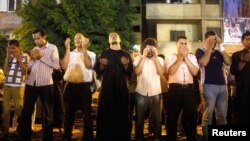Prospects for a quick return to peace in Egypt are slim as the Muslim Brotherhood calls for continued street protests demanding the return to power of ousted President Mohamed Morsi. World leaders are urging the two sides to come to a compromise.
Morsi supporters vow the protests will continue until he is returned to power, even after more than 80 of them were killed in recent clashes. On Tuesday, hundreds of women marched in Cairo calling for Morsi's reinstatement.
"I am here so I could express myself and tell the world that this was not a revolution," a protester said."It was an illegitimate military coup."
The march coincided with a visit by European Union policy chief Catherine Ashton, the first outsider to meet with the detained president.
U.S. President Barack Obama has asked U.S. Senators John McCain and Lindsey Graham, (both members of the Armed Services Committee), to travel to Egypt next week to push for speedy elections. Defense Secretary Chuck Hagel called Egyptian military chief Abdul Fattah al-Sissi again Tuesday to ask him to exercise restraint.
Analyst Richard Fontaine, president of the Center for New American Security, said both the United States and Europe must push Egypt to move forward with an inclusive democratic process.
"The worst possible outcome here is for the Muslim Brotherhood to be completely excluded from the political process and turn to violence, or ally itself with groups that will turn to violence. It then will paralyze the country.
Fontaine said that it is incumbent upon Egypt's military to spell out a detailed roadmap back to democracy, based on law and non-violence.
Egyptians tired of violence in their streets say all they want is peace and security, regardless of who is in power.
"I want the country to return to a state of security where your wife would feel safe to walk in the streets," Cairo resident Tarek Abied said. "We need nothing more. We don't want Hosni Mubarak or [President] Morsi, just security."
For now, peace and security are not guaranteed in Egypt.






